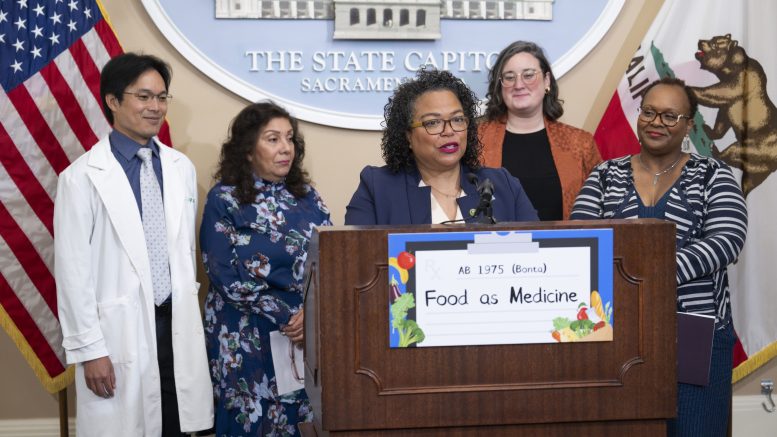The Legislature and governor will need to act this year if the state is to continue providing food as medicine for low-income residents.
By George B. Sánchez-Tello
This story is produced by the award-winning journalism nonprofit Capital & Main and co-published here with permission.
When Nazifa Hakimzada met with her doctor in 2022, she was warned she had hypertension and was pre-diabetic. She was also managing chronic pain and depression. The 56-year-old woman asked if there was an option other than prescription drugs.
Fortunately, there was indeed an alternative. Her doctor’s office at the Hayward Wellness Center in the San Francisco Bay Area city of Hayward was practicing a new treatment called “food as medicine.” Instead of drugs, Hakimzada’s doctor prescribed fresh produce, which would be delivered to her home for free.
Less than two years later, she is no longer pre-diabetic.
Hakimzada was part of a pilot food-as-medicine program in Alameda County (among other places) called Recipe4Health, which offers “food prescriptions” to low-income patients covered by Medi-Cal. Versions of the pilot program are also running throughout the state.
Just as important as treating her hypertension and high blood sugar, Hakimzada now has a better understanding of how the food she eats directly affects her health, which will help her to stay healthy.
“In my house, you don’t find ‘boxes,’” Hakimzada said, a term she uses to describe unhealthy, processed food that is cheap, dry and storable. “We want to get fresh.”
In Alameda County, low-income earners like Hakimzada lowered their cholesterol and managed their diabetes through a doctor’s prescription to eat more vegetables. Patients were delivered a grocery bag of leafy greens, carrots, onions and beets for three months. They also had cooking lessons, exercise classes and a support group of other residents learning to make healthier food and exercise choices — all online.
Currently, 29,000 Californians benefit from the food-as-medicine pilot. The relatively small, weekly investment of 16 portions of healthy vegetables and support lessened the impact of chronic illness. Doctors, dieticians and researchers familiar with the program also learned that patients preferred healthier foods as a treatment over prescription drugs.
The improvements achieved through Hakimzada’s changes in diet, exercise and personal choices were common among other participants, according to Stanford researchers who presented this spring at a conference of the American Heart Association. Food prescriptions lowered cholesterol and improved blood sugar for patients with Type 2 diabetes at four health centers in Alameda County. Residents improved their health with a weekly delivery of a grocery store bag of fresh produce, said Wei-Ting Chen, one of the researchers.
Since 2022, the federal government has reimbursed food-as-medicine programs across California. Every county in the state will have some form of the program by 2025.
But the federal funding for the program runs only through the end of 2026. Though that deadline is more than two years away, decisions this year by elected officials in Sacramento are critical if the program is to continue beyond 2026.
Since Gov. Gavin Newsom announced his proposed budget cuts last month, legislators have been scrambling to settle their differences over spending with the governor. Any work to extend the food-as-medicine program will likely be put off until legislators return from their summer recess in August.
Assemblymember Mia Bonta (D-Oakland) has introduced AB 1975, the Food as Medicine bill, which would make food-as-medicine programs a permanent benefit of Medi-Cal by July 1, 2026. Last year, Bonta proposed AB 1644, a similar food-as-medicine bill. But the bill did not move after an analysis by appropriations committee staff reported the cost was “unknown,” though “likely in the tens of millions of dollars.”
AB 1975 would create a group of experts to estimate the number of Medi-Cal recipients with chronic medical conditions such as Type 2 diabetes that could be treated with food as medicine. If AB 1975 does not pass this year, that group of experts will not have adequate time to determine how many should be eligible, said Katie Ettman, deputy director of Fullwell, a food advocacy organization in San Francisco.
If AB 1975 passes the Legislature and is signed into law by Gov. Newsom in the fall, there will be adequate time to write regulations for the new food-as-medicine program and advocate for the right level of funding.
The California Senate Health Committee has scheduled a hearing on AB 1975 on Wednesday, June 12.
Hakimzada’s story shows the value of continuing the program. She has ceased suffering from the medical conditions that made her eligible. Participants in the Recipe4Health program are limited to three months, after which they ideally continue healthy routines. That’s been the case for Hakimzada, who now buys vegetables and knows to cook and eat the fresh food right away. Her behavior and health have changed, hopefully for good. Hakimzada’s parents and aunt, whom she takes care of, have also improved their diet. Her preference for fresh food over cheaper, processed goods has rubbed off on her sister, who now shops the same way. “My family knows: Get your fruits and vegetables; no more boxes.”
Copyright 2024 Capital & Main


Be the first to comment on "California program to treat chronic conditions through healthy diets could end"